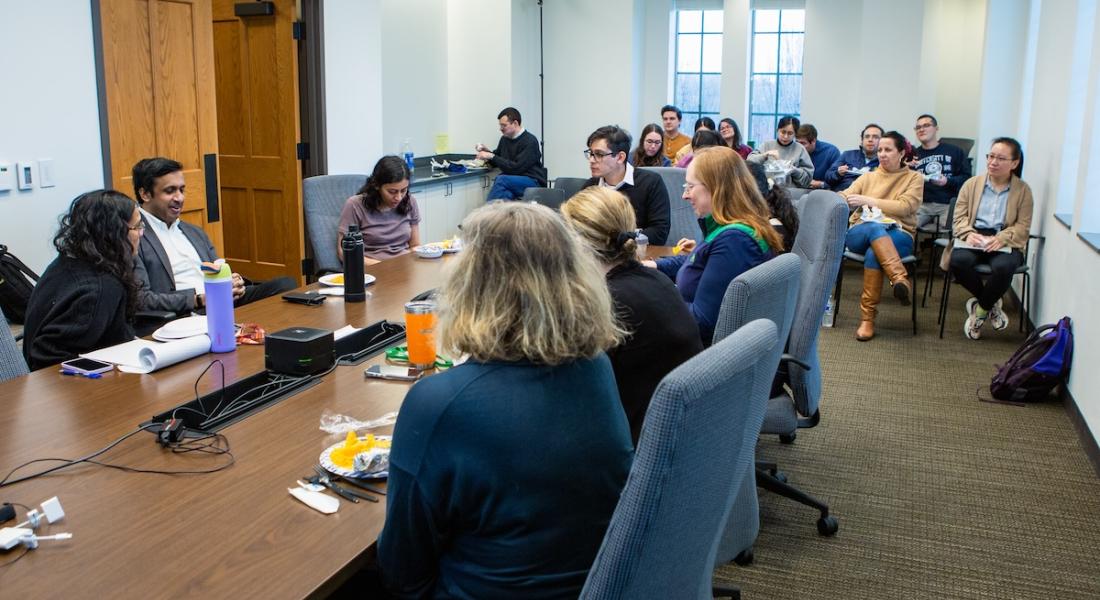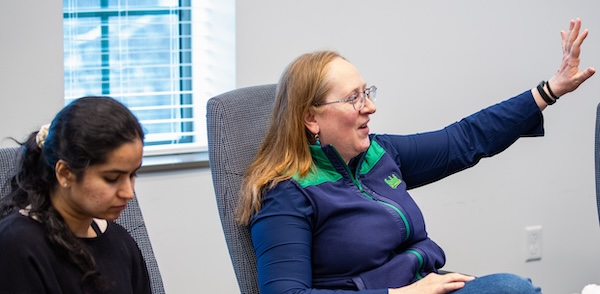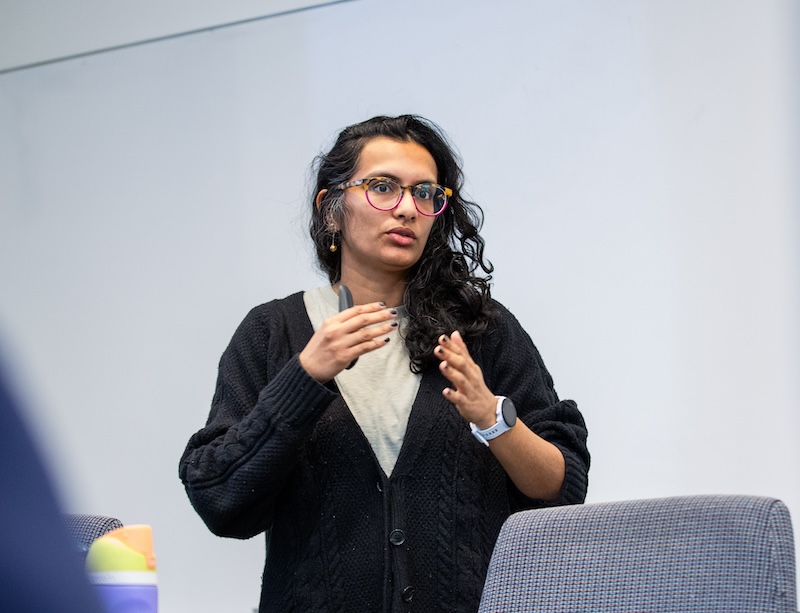
Kellogg Doctoral Student Affiliate Lixia Ren will graduate from the University of Notre Dame in May as an economist, but not before taking her long walk through Tibet. Ren traveled on foot for three days to the Lhasa capital to better understand the logistics challenges of transporting goods – and knowledge and ideas, too – to a city that’s about 3,600 meters above sea level in a remote part of the world.
“China changed substantially in the last 30 years,” said Ren, who focuses on transportation and access to electricity in her dissertation. “But driving can take two days even with a modern car and roads.”
She committed three months to field research on China’s development and is verifying data from businesses in 10 Tibetan counties to evaluate how infrastructure supports investment and economic growth. She presented her initial findings to the Development Economics Working Group led by Kellogg Faculty Fellow Nilesh Fernando, assistant professor of economics, and others, benefitting from the insights of students and faculty alike as she refined her work.
There are now 10 or more graduate students and about eight faculty members who regularly meet to discuss research in progress and connect over a working group lunch with interested colleagues who visit from among Kellogg’s visiting fellows, the Building Inclusive Growth (BIG) Lab or the Pulte Institute for Global Development, for example.
After their second year, students are encouraged to present at least once per semester. They hear about data sets they might access, opportunities for collaboration, and the chance to connect with faculty.
 “The community of development economists has coalesced around this group,” says Taryn Dinkelman, the Loughrey Associate Professor of Economics and Kellogg Institute faculty fellow. Dinkelman, along with Faculty Fellow Joseph Kaboski, the David F. and Erin M. Seng Foundation Professor of Economics, serves as Ren’s advisor.
“The community of development economists has coalesced around this group,” says Taryn Dinkelman, the Loughrey Associate Professor of Economics and Kellogg Institute faculty fellow. Dinkelman, along with Faculty Fellow Joseph Kaboski, the David F. and Erin M. Seng Foundation Professor of Economics, serves as Ren’s advisor.
Dinkelman says that group organizers like Fernando and Faculty Fellow Lakshmi Iyer, an associate professor of economics studying political participation and women, really wanted the experience to contrast with more formal seminar settings. It keeps a focus on Notre Dame researchers, rather than inviting speakers from elsewhere. The Kellogg working group creates a safe space for new ideas and early-stage feedback.
“The breadth of development economics questions that students and faculty are addressing in this group reflects the diversity of challenges facing low-income countries,” says Dinkelman, who works on education and labor market issues in sub-Saharan Africa. A political economist might study low-income countries and the distribution of resources, while another focuses on small business in El Salvador. She points to Fernando’s work on international labor migrants, and the unintentional negative impact of policies meant to benefit them, as distinctly different from Ren’s big-picture look at infrastructure investment.
Fernando is from Sri Lanka and says South Asia is very much where his research focus has been so far. For many of the region's countries, Nepal and Bangladesh as well as Sri Lanka, international migration is an economic reality, he said. His recent work on migration, co-authored with Kellogg Faculty Fellow Niharika Singh, will appear in The Review of Economics and Statistics.
“Upwards of eighty percent are going to Gulf countries, and for all of those migrants in construction, or as domestic workers, imagine that you grew up in a village in Sri Lanka and you suddenly find yourself in a home in Qatar,” he explains. “The paper looks at the role that intermediaries play in matching migrants to jobs in foreign labor markets.”

Fernando describes the Development Economics Working Group as a clearinghouse for these ideas, even as the secret of any good weekly workshop is to provide lunch along with the camaraderie. To see a senior faculty member like Kaboski clamor for more tacos, he said, helps students and faculty at all levels to feel welcomed as part of an inclusive group with shared goals based on collegial respect.
Ren will be headed to a postdoctoral position in the Gulf, too, and will focus on electrification in Zambia from her post at NYU-Abu Dhabi. She was able to land the spot with help from Dinkelman and Kaboski, and will build on previous work she did on Ethiopia when she was completing her studies in China.
She credits the Development Economics Working Group and her advisors with investing in her growth and helping her to transform into an economist and scholar. And, speaking in economic terms, Ren says she’s become a producer rather than just a consumer of knowledge.
The Kellogg Institute for International Studies, part of the Keough School of Global Affairs at the University of Notre Dame, is an interdisciplinary community of scholars and students from across the University and around the globe that promotes research, provides educational opportunities, and builds partnerships throughout the world on the themes of global democracy and integral human development.





